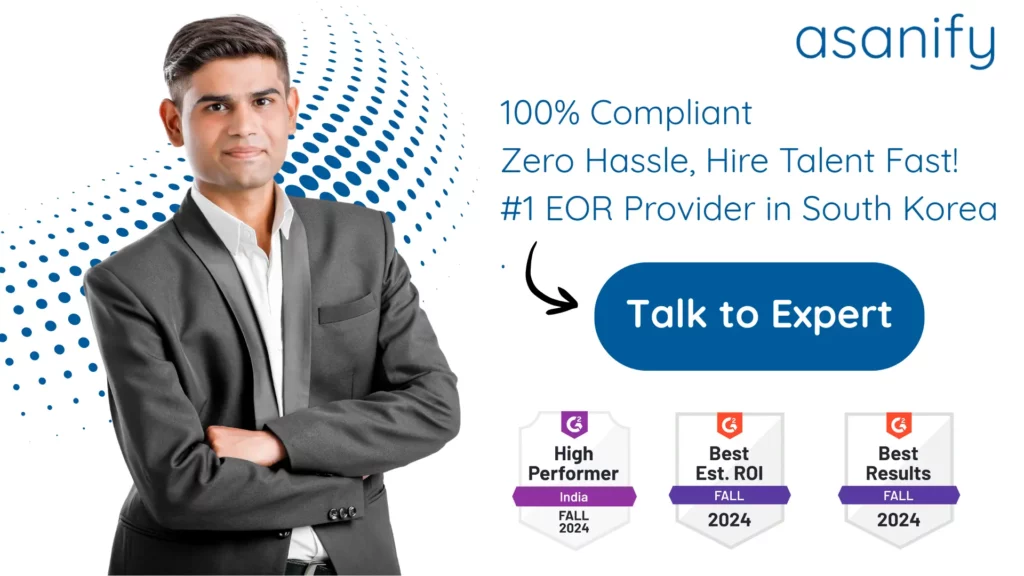Learn the legal steps, salary structures, benefits, and total employer costs to hire remote team in South Korea. This guide covers the talent landscape, labor law compliance, and how an EOR can streamline global hiring.
South Korea is becoming a top choice for remote hiring in 2025. With a digitally savvy population, strong broadband infrastructure, and high levels of education in science, tech, and engineering, it offers global companies a dynamic and productive talent pool. Additionally, its time zone advantage for both APAC and Western markets makes it an ideal hub for international business expansion.
Table of Contents
- Overview of South Korea for Remote Hiring
- Leading Industries Driving Employment in South Korea
- Industry Landscape Snapshot
- Cost of Living for Remote Employees in South Korea
- In-Demand Skills in South Korea (2025)
- Key Legal Considerations for Hiring in South Korea
- Payroll and Tax Compliance in South Korea
- Using an EOR for Payroll and Compliance in South Korea
- Salary Ranges for Remote Roles in South Korea
- Steps to Hire a Remote Team in South Korea
- Total Cost of Hiring Remote Employees in South Korea
- How Can Asanify Simplify Hiring a Remote Team in South Korea?
- Conclusion
- FAQs
Overview of South Korea for Remote Hiring
South Korea ranks among the most advanced digital economies in the world, supported by cutting-edge infrastructure and a well-educated workforce. The country’s emphasis on innovation, automation, and global trade makes it highly attractive for companies seeking remote professionals.
Remote work adoption continues to grow post-pandemic, with many employers offering hybrid or fully remote models. Additionally, the government’s push for digital transformation and smart work centers enhances remote productivity.
Leading Industries Driving Employment in South Korea
Key sectors with high demand for remote talent include:
- Technology and IT Services: Especially in AI, gaming, mobile apps, and cybersecurity.
- Manufacturing and Electronics: South Korea is home to global giants in semiconductors, robotics, and telecom.
- Finance and Fintech: Seoul is a financial hub with a growing fintech ecosystem.
- Healthcare and Biotech: Particularly strong in pharmaceuticals, medical devices, and diagnostics.
- Media and Design: Korean culture’s global influence has created new roles in digital marketing and creative industries.
These industries are increasingly open to hiring distributed teams for competitive global operations.
Industry Landscape Snapshot
South Korea’s economic framework supports both enterprise-scale and startup ventures. Seoul and Busan are tech hubs with thriving startup ecosystems, supported by incubators and government incentives. Key cities have coworking spaces, advanced tech infrastructure, and a remote-work-ready environment.
The country’s multilingual talent, particularly in Korean and English, allows remote teams to work seamlessly with global stakeholders.

Cost of Living for Remote Employees in South Korea
South Korea offers a moderate cost of living compared to Japan or Singapore. Seoul is the most expensive city, while Incheon, Daejeon, and Busan offer more affordable living options.
| Expense Category | Typical Monthly Cost (₩) | Notes |
| Housing | ₩800,000 – ₩1,500,000 | Higher in Seoul; affordable in Daejeon or Busan |
| Utilities | ₩150,000 – ₩250,000 | Includes gas, water, internet |
| Transport | ₩60,000 – ₩80,000 | Excellent subway and bus system |
| Food & Groceries | ₩400,000 – ₩600,000 | Includes local and Western options |
| Leisure & Miscellaneous | ₩200,000 – ₩300,000 | Includes entertainment and fitness |
Remote workers can maintain a high quality of life while remaining cost-effective for employers.
In-Demand Skills in South Korea (2025)
South Korean professionals are known for their precision, tech acumen, and work ethic. In-demand skills include:
- Software Development & Engineering
- Cybersecurity and AI/ML
- Finance & Compliance (K-IFRS, tax, auditing)
- UX/UI Design and Game Design
- Digital Marketing and SEO
- English-Korean bilingual customer support
These skills are especially valuable in global tech, finance, and design teams.
Suggested Read: Remote Employees Onboarding Checklist with EOR in South Korea
Key Legal Considerations for Hiring in South Korea
Hiring in South Korea requires careful adherence to local labor regulations, tax codes, and employee protection laws. Employers must comply with rules concerning employment contracts, statutory benefits, social insurance registration, and worker classification. Non-compliance can lead to government audits, fines, and reputational damage. A clear understanding of South Korea’s labor framework enables efficient, compliant remote team hiring.
Employment Laws
South Korea’s labor laws are governed primarily by the Labor Standards Act (LSA), which mandates minimum employment conditions. These laws cover wages, working hours, leave, severance pay, and workplace protections. Employers are required to observe both national labor regulations and industry-specific rules.
- Employers must follow the Labor Standards Act and related labor statutes.
- Mandatory compliance with wage, severance, and paid leave provisions.
- Strong legal protections for workers regarding dismissal and discrimination.
- Violations can lead to labor inspections, penalties, and court litigation.
Work Hours and Overtime
The standard workweek in South Korea is 40 hours (8 hours/day, 5 days/week). Additional work is considered overtime and is strictly regulated. Employers must compensate overtime at a premium rate or provide compensatory rest, in line with national labor policies.
- Standard working hours: 40 hours per week (8 hours/day).
- Overtime is capped at 12 additional hours weekly, with a 150% pay rate.
- Employers must record working hours and pay premiums where required.
- Violations may trigger labor investigations and employer penalties.
Employment Contracts
Written employment contracts are legally required in South Korea and must include specific employment terms. These documents protect both the employer and employee by clearly defining expectations and obligations. Contracts should outline wages, duties, working hours, benefits, and severance terms.
- Contracts must specify job duties, salary, benefits, and working hours.
- Required to include vacation entitlements and severance eligibility.
- Termination clauses must follow LSA rules to avoid unlawful dismissal claims.
- Contracts are typically drafted in both Korean and English for global hires.
Worker Classification
Distinguishing between employees and independent contractors is critical in South Korea. Misclassification can result in back payments of social insurance, pension, and tax obligations. Authorities assess classification based on the degree of control, exclusivity, and financial dependence.
- Employees are subject to employer control and eligible for benefits.
- Contractors operate independently and are responsible for their own taxes.
- Misclassification may result in retroactive contributions, fines, and legal action.
- Clearly defined contracts and operational independence help mitigate risk.

Payroll and Tax Compliance in South Korea
Employers in South Korea must comply with detailed payroll and tax obligations to ensure accurate salary disbursement and lawful contributions to national insurance programs. These include income tax withholding, mandatory social security contributions, and employer filings with government agencies. Any delay or misreporting can lead to audits, penalties, or reputational harm. Maintaining accurate and timely payroll processes is essential for legal and financial compliance.
Payroll Taxes and Deductions
Employers in South Korea are required to withhold income tax and deduct mandatory social insurance contributions from employee salaries. These deductions cover pension, health insurance, employment insurance, and long-term care. Payroll accuracy and timely remittance are crucial to avoid financial and legal consequences.
- Withhold monthly personal income tax under a progressive tax system.
- Deduct employee contributions for national pension (4.5%), health insurance (3.5%), and long-term care insurance (part of health).
- Deduct employment insurance premiums (0.9% shared with employer).
- Submit payroll withholdings to the National Tax Service (NTS) and relevant social insurance agencies.
Employer Contributions
South Korean employers are responsible for contributing an additional portion to national insurance schemes. The total employer-side cost typically ranges between 18% and 20% of an employee’s gross salary. These payments fund employee pensions, medical care, unemployment insurance, and workplace accident coverage.
- Employer contributions include pension (4.5%), health insurance (3.5%), and employment insurance (0.65%–0.9%).
- Must also pay Industrial Accident Compensation Insurance (0.7%–3.4%, depending on industry).
- Contributions are remitted to various agencies such as the National Pension Service and the Korea Workers’ Compensation & Welfare Service.
- Late or incorrect payments may trigger audits, interest charges, or legal action.
Employee Benefits
South Korea mandates a variety of employee benefits to ensure worker protection and welfare. These include statutory paid leave, severance pay, and enrollment in national social insurance programs. In many sectors, additional benefits like meal subsidies, holiday bonuses, or remote work stipends are common.
- Paid annual leave begins with 11 days in the first year, increasing with tenure.
- Employees who complete one year of service are entitled to severance pay equal to one month’s salary per year.
- Mandatory enrollment in National Pension, Health Insurance, Employment Insurance, and Industrial Accident Insurance.
- Additional perks may include transportation stipends, cultural activity allowances, or flexible work benefits depending on employer policies.
Using an EOR for Payroll and Compliance
Companies can simplify payroll, tax compliance, and employee benefits management in South Korea by partnering with an Employer of Record (EOR). An EOR ensures full adherence to local labor laws, accurately processes payroll, handles statutory contributions, and mitigates compliance risks. This approach is ideal for companies that want to hire remote teams in South Korea without establishing a legal entity.
- Handles payroll processing and income tax filings in full compliance with South Korean labor laws.
- Manages employee benefits and statutory social insurance contributions, including pension, health, and employment insurance.
- Reduces the risk of worker misclassification and non-compliance penalties related to contracts, severance, and reporting.
- Enables faster hiring and onboarding of remote employees without the time and cost of setting up a local subsidiary.
Salary Ranges for Remote Roles in South Korea
| Role | Annual Salary (₩) | Annual Salary (USD) | Notes |
| Software Engineer | ₩55M – ₩80M | $42K – $61K | Higher for full-stack and backend |
| Data Analyst | ₩50M – ₩70M | $38K – $54K | SQL, Python, Tableau in demand |
| Project Manager | ₩60M – ₩90M | $46K – $69K | IT and R&D sectors lead demand |
| Digital Marketing Specialist | ₩45M – ₩65M | $34K – $50K | Bilingual marketers earn more |
| HR & Payroll Specialist | ₩48M – ₩68M | $36K – $52K | High demand for local compliance experts |
| Customer Support Executive | ₩35M – ₩50M | $27K – $38K | English-speaking roles pay higher |
| Finance & Tax Analyst | ₩55M – ₩75M | $42K – $58K | IFRS and Korean tax experts earn premium |

Steps to Hire a Remote Team in South Korea
Building a remote team in South Korea requires thoughtful planning, strict legal compliance, and streamlined hiring processes. From identifying the right talent to ensuring proper onboarding, each step plays a critical role in maintaining operational efficiency and adhering to Korean labor regulations. Following these structured steps allows global companies to scale quickly while minimizing compliance risks and administrative burden.
1. Define Hiring Needs
- Determine required roles and experience.
- Decide on contractor vs full-time employee model.
- Outline scope, workload, and budget.
2. Choose a Hiring Model
- Local Entity: Full compliance but time- and cost-intensive.
- Contractor: Flexible but riskier.
- EOR Partner: Fastest route to compliant employment.
3. Source and Interview Talent
- Use Korean job boards, LinkedIn, and global platforms.
- Partner with local recruiters for niche roles.
- Conduct bilingual interviews and skill assessments.
4. Draft Offer Letters and Contracts
- Include salary, benefits, leave, and severance as per LSA.
- Contracts should be in both Korean and English.
- EORs can manage contract issuance and review.
5. Onboard and Manage Remote Employees
- Register for social security and tax compliance.
- Offer remote work equipment and local HR support.
- Use EOR dashboards to handle payroll, reviews, and offboarding.
Total Cost of Hiring Remote Employees in South Korea
| Role | Avg Salary (₩) | Employer Contributions (20%) | Benefits | Total Cost (₩) |
| Software Engineer | ₩67,500,000 | ₩13,500,000 | ₩3,000,000 | ₩84,000,000 |
| Data Analyst | ₩60,000,000 | ₩12,000,000 | ₩2,500,000 | ₩74,500,000 |
| Project Manager | ₩75,000,000 | ₩15,000,000 | ₩3,500,000 | ₩93,500,000 |
| Digital Marketing Specialist | ₩55,000,000 | ₩11,000,000 | ₩2,000,000 | ₩68,000,000 |
| HR & Payroll Specialist | ₩58,000,000 | ₩11,600,000 | ₩2,200,000 | ₩71,800,000 |
| Customer Support Executive | ₩42,500,000 | ₩8,500,000 | ₩1,500,000 | ₩52,500,000 |
| Finance & Tax Analyst | ₩65,000,000 | ₩13,000,000 | ₩2,800,000 | ₩80,800,000 |
How Can Asanify Simplify Hiring a Remote Team in South Korea?
Asanify acts as an Employer of Record in South Korea, managing payroll, employment contracts, statutory benefits, and labor law compliance on behalf of global employers. This enables companies to onboard remote employees within 1–2 weeks, ensuring faster hiring without the complexities of setting up a local entity. Asanify ensures full compliance with South Korea’s labor regulations, helping companies avoid misclassification risks, tax liabilities, and administrative delays.
Additionally, Asanify takes care of mandatory social insurance contributions, monthly payroll tax filings, and employment law obligations. By centralizing HR, payroll, and compliance operations, Asanify allows global businesses to scale confidently and focus on strategic growth while ensuring smooth workforce management in South Korea.
Suggested Read: Understanding Labour Laws in South Korea
Conclusion
South Korea is an attractive destination for hiring remote teams due to its highly skilled workforce, advanced digital infrastructure, and strong economic foundation in the Asia-Pacific region. By partnering with an Employer of Record, global businesses can simplify compliance with South Korean labor laws, accelerate time-to-hire, and manage payroll and statutory obligations with ease. This approach allows companies to build distributed teams without setting up a local entity, ensuring full legal and administrative compliance while focusing on business growth and productivity.
FAQs
Either by setting up a Korean legal entity or using an Employer of Record (EOR) to compliantly hire without incorporation.
₩10,300/hour (~₩1.8M/month for full-time) — updated annually by the Ministry of Employment and Labor.
40 hours/week, with a maximum of 52 hours including regulated overtime.
Yes, one month’s salary per year worked after completing one full year.
Employers must withhold income tax and remit contributions for pension, health, employment, and accident insurance.
Yes, but strict classification laws apply. Misclassification can result in penalties and retroactive contributions.
Health insurance, pension, annual leave, severance, and labor protections under the LSA.
Total employer cost = Gross salary + ~20% contributions + benefits. An EOR can streamline calculations and compliance.
Asanify manages contracts, payroll, insurance, and tax filings, enabling quick and compliant hiring without a local entity.
Not to be considered as tax, legal, financial or HR advice. Regulations change over time so please consult a lawyer, accountant or Labour Law expert for specific guidance.

